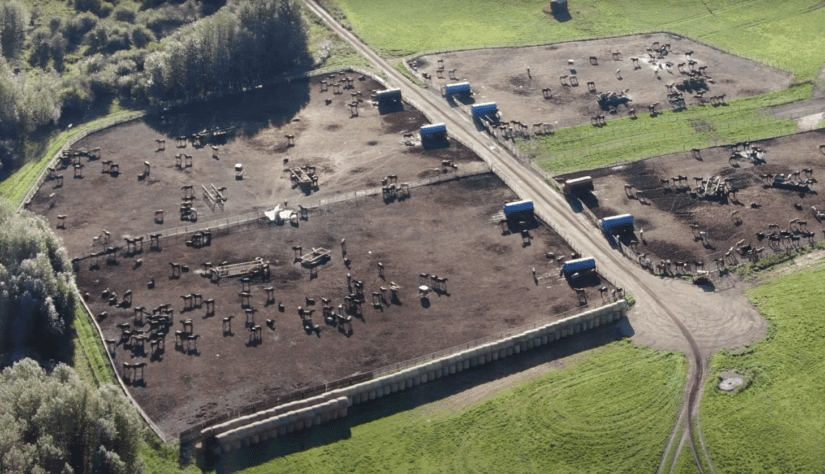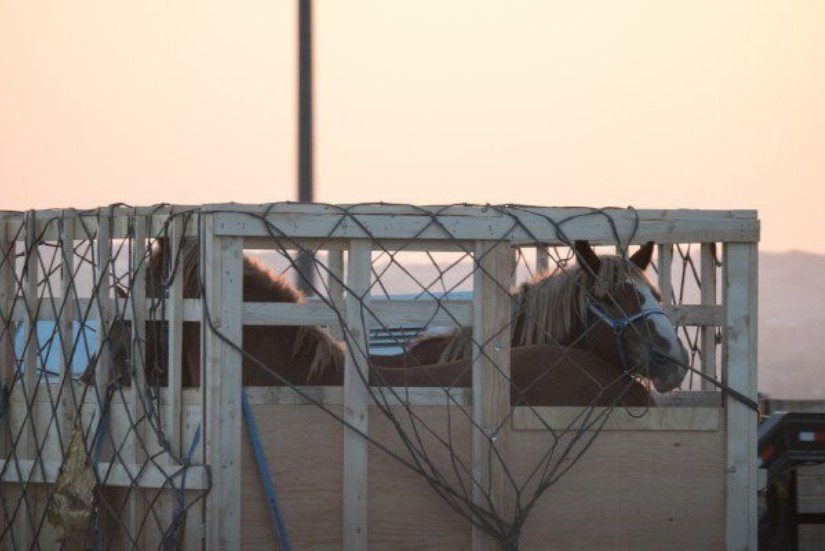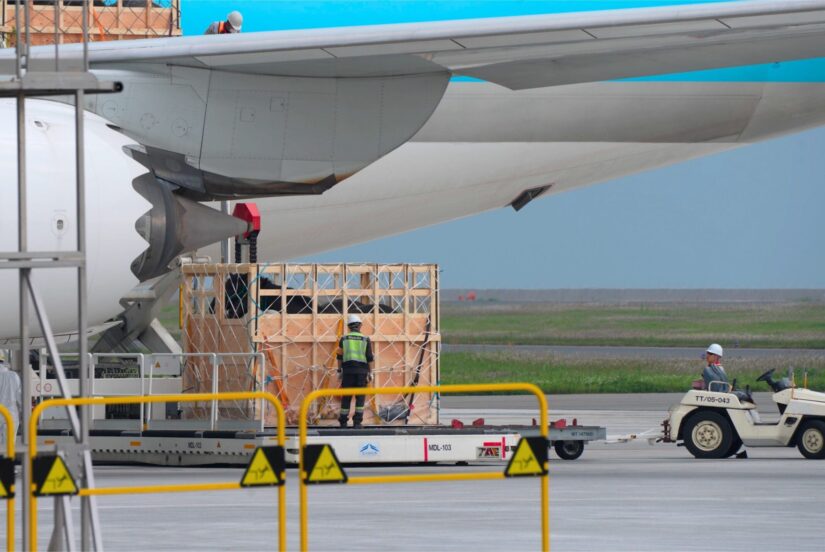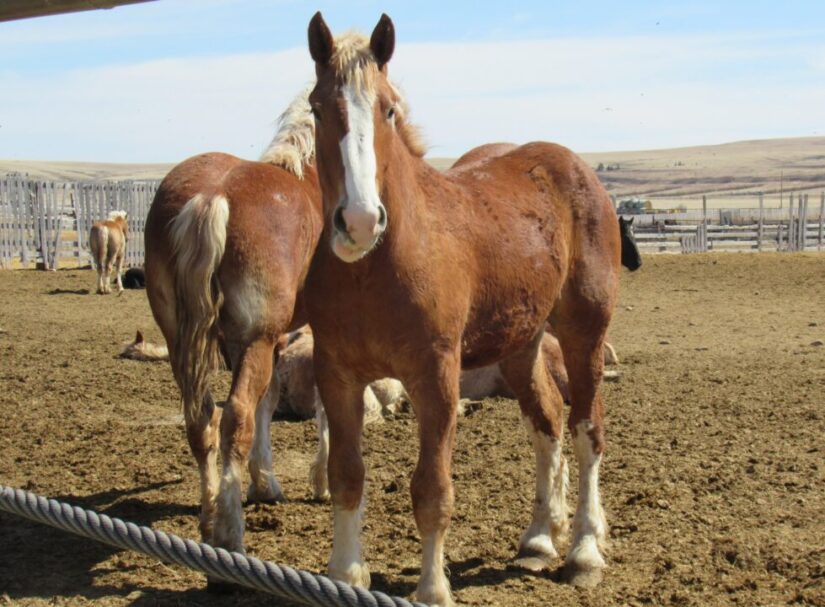Horse meat is eaten in many countries across the globe, including in Canada. Yet, Canada is one of the only countries in the world that breeds, raises, and transports horses overseas for slaughter to fill the demand for fresh horse meat. Gentle draft horses are raised in poor conditions and are exported by plane on journeys that can take more than 20 hours. Since 2013, more than 50,000 horses have been exported out of Canada. These horses are purpose bred for export, not sourced from auctions, as the importing countries have strict health standards. If live horse export is banned, it will stop the breeding of Canadian horses for this specific purpose. It does not impact horses sold at auction.
Across the country, thousands of Canadians continue to speak out against this practice. In an April 2024 national poll*, only 22% of Canadians disagree with ending the export of live horses. Specifically, 78% of Albertans, one of the provinces that exports horses to Japan, no longer want horses from their province shipped overseas. Among Indigenous people in Canada, 71% agree that this practice should be banned.
Horses exported for slaughter are raised on feedlots in Western Canada. Feedlots are barren plots of land where horses are often not provided shelter or protection from the elements. Minimal veterinary oversight and care are provided.

The horses’ long journey begins when they are transported by truck from the feedlot to the airport – usually in Calgary, Edmonton, or Winnipeg. As prey animals with strong fight-or-flight instincts, horses are extremely sensitive to the unfamiliar stimuli they experience during transport. Unlike horses kept as companion animals or used for show or sport, horses destined for the meat industry are unaccustomed to being transported, so this can cause them significant distress.
At the airport, the horses may sit on the tarmac for hours before being loaded onto the plane. Before being loaded, three to four horses are put into a single shipping crate smaller than the average horse stall. Due to the limited space available to each horse, horses can easily injure one another or lose their balance and be unable to get back up. Current international airline transport regulations require horses to be able to stand in a comfortable position without coming into contact with the top of the crate, but eyewitnesses often report that crates are too short for the horses to stand comfortably without their ears touching or pushing through the top of the crate.

Horses fly in these crates without feed, water, or rest for the entire journey. The flight is between 10 to 13 hours and may stop to refuel in Alaska, adding two to three hours to their long journey. For international export, the typical time without feed, water, and rest for these horses is 20 to 22 hours, but there have been cases recorded that exceed this. It is currently legal for horses to be transported without feed, water, or rest for up to 28 hours. A 2024 report (PDF) by Animal Justice found that flights were exceeding this maximum time limit, however. The BC SPCA strongly advocates that no animal should be transported without feed, water, or rest for more than eight hours – and that no horses should be flown under such circumstances.
Horses are at an increased risk of injury, dehydration, and fatigue as journey duration increases. Horses are a species that has evolved to graze and would normally spend over 65 per cent of their day eating. When horses are not fed regularly, they are at a much higher risk for painful and life-threatening conditions such as gastric ulcers and colic and will show signs of stress. Another report (PDF) by Animal Justice in 2024 found that in just one year, 21 horses died during transport. Additional injuries and illnesses, including salmonella, wounds, diarrhea, falls, eye injuries, and leg injuries, were also found.

Developments in the fight to end Canada’s live horse export
2025
- January 6 – Prorogation puts Parliament on hold.
2024
- December 16 – Three-year anniversary of the Minister of Agriculture’s mandate letter from the Prime Minister to ban the live export of horses overseas for slaughter.
- December – New data reveals another death and further injuries during shipments.
- September – New data shows that 21 horses died in a single year during transport.
- June – New data reveals shipments are regularly exceeding the legal limit for transport duration without feed, water, or rest.
- May 21 – The first reading of Bill C-355 in the Senate was completed.
- May 9 – The third reading for Bill C-355 in the House of Commons was completed and referred to the Senate.
- April 29 – The Standing Committee on Agriculture and Agri-Food completed their study of the bill and agrees to report the bill back to the House of Commons with amendments.
- February – April – The Standing Committee on Agriculture and Agri-Food met to discuss Bill C-355.
- January 31 – The second reading for Bill C-355 in the House of Commons was completed and passed the vote to be sent to the Standing Committee on Agriculture and Agri-Food for consideration.
2023
- November 20 – Bill C-355 was read for the second time and debated by our representatives in the House of Commons.
- September 19 – Tim Louis, M.P. introduced Private Member’s Bill C-355 to the House of Commons to prohibit the export of horses for slaughter. The Prime Minister’s Office has expressed their support for this bill.
- June 21 – Senator Pierre Dalphond introduced Bill S-270 to Senate to prohibit live horse export.
- March 29 – Government response to petition e-4190 was tabled, stating they are working to implement the mandate letter to ban live horse export.
- February 13 – Petition e-4190 presented to the House of Commons by MP Alistair MacGregor.
- February 7– Petition e-4190 closed with a total of 36,175 signatures.
2022
- November 15 – BC SPCA sent a letter to the Minister of Agriculture and Agri-Food asking about the status of their mandate to ban live horse export, requesting an updated timeline for banning the practice.
- November 9 – CHDC initiated another federal petition (e-4190) calling on the Minister of Agriculture and Agri-Food to halt the live export of horses for slaughter, consistent with the Minister’s mandate letter.
2021
- December 16 – Banning the live export of horses for slaughter was included in the Prime Minister’s mandate letter to the Minister of Agriculture and Agri-Food.
- August 15 – The government was unable to table a response to the petition before Parliament was dissolved.
- June 22 – Petition e-3187 presented to the House of Commons by MP Nathaniel Erskine-Smith.
- June 18 – Petition e-3187 closed with a total of 77,684 signatures, making it the most-signed federal e-petition relating to animals in history.
- April 29 – BC SPCA joined the CHDC and other animal protection organizations in sending a letter to the federal government urging action on this issue.
- February 18 – Canadian Horse Defence Coalition (CHDC) initiated a federal petition (e-3187) calling upon the government to stop air shipments of horses exported for human consumption, due to ongoing animal welfare concerns.
Take action
In the lead up to the 2025 federal election, over 9,500 caring Canadians helped ensure that animal welfare is a federal priority by calling on Canada’s political parties and candidates to:
- Update the Criminal Code to better protect animals and people
- End the live export of horses by air for slaughter overseas
- Expand B.C.’s mink farm ban to prohibit fur farms across Canada
With your ongoing support and action, we’ll continue advocating for these important changes with our new federal government.

Additional resources
*ResearchCo. poll conducted for the BC SPCA April 3-5, 2024 (n=1,000, margin of error +/-3.1%, 19 times out of 20)
